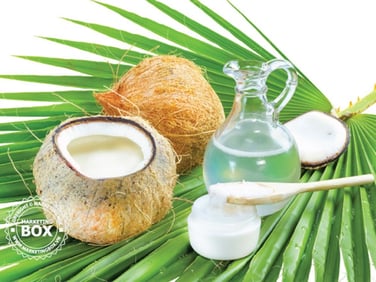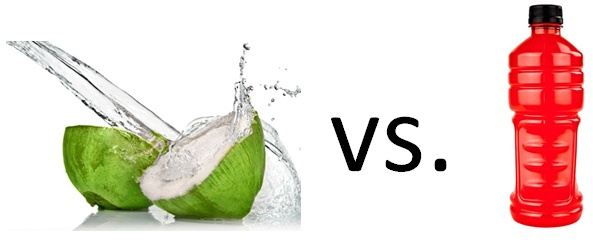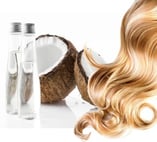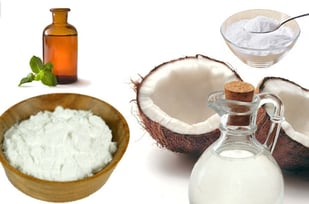Original writer: Bradley C. Goss
Coconut pulp, juice, milk, and oil have fed, nourished, and healed many populations around the world for thousands of years. For centuries, Pacific Islanders have called this tree, “The Tree of Life”, and it has been valued and revered for its many medicinal uses. Close to a third of the world’s population depend on the coconut, with it being rich in fiber, vitamins, minerals, and highly nutritious. It also has many other uses due to its strong fibers and ability to hold weight. While some people may think coconut a nut, solely based on its name, it is actually a fibrous drupe, or a type of fruit with a hardened or husk exterior surrounding an internal stone, which houses the seed. Considered a superfood, this fruit and its oil possess many healing properties which are believed to be highly beneficial for health and well-being, such as fat-burning, brain-boosting, and wound healing, to name a few. This plant was traditionally used to heal a wide variety of health problems such as asthma, bronchitis, bruises, burns, dysentery, flu, fever, gonorrhea, syphilis, scurvy, jaundice, kidney stones, tuberculosis, typhoid, and general weakness. Up to the Second World War, the people of the Philippines and other islands consumed a diet of vegetables, root crops, rice, and an abundance of coconuts.
Although this diet was very high in saturated fats, western disease such as diabetes, cancer, and heart disease were virtually unheard of.
After the war, the U.S. proclaimed hydrogenated oils to be healthy and coconut oil to be a very dangerous saturated fat. By the 1960’s, the saturated fat health scare was in full gear. The inexpensively, mass-produced hydrogenated oils replaced coconut oil, as processed food replaced whole foods.
Just as in the United States, the Island nations became plagued with cancer, diabetes, heart disease, and obesity.

Coconut oil is an MCFA that does not require energy for absorption while it boosts the immune system and protects its consumer from viruses!
The Science:
Coconut oil is different from most other oils because of its fat molecule configuration. One way fatty acids are classified is based on the molecular length of its carbon chain. In this classification, there are:
- short-chain fatty acids (SCFA) – butterfat from cows & goats
- medium- chain fatty acids (MCFA) – butterfat & tropical oils (coconut!)
- long-chain fatty acids (LCFA) – olive oil, vegetable oil, & animal fats
- very long-chain fatty acids (VLCF) – organ meat, egg yolks, & fish oils
SCFA, or small-chain fatty acids, have 4-6 carbon atoms and are found in butterfat from cows and goats. VLCF’s have 20-24 carbon atoms found in organ meat, egg yolks, and fish oils. LCFA’s have 14-18 carbon atoms, found in olive oil, vegetable oil, and animal fats. Medium-chain fatty acids have 8-12 carbon atoms and are found also in butterfat, coconut oil, and a few other tropical oils. They are passively diffused and absorbed in the body for quick energy, and contribute to the health of the immune system. MCFA’s do not require energy for absorption, utilization, and storage, thus leaving the body’s energy free for other tasks. They also have antimicrobial properties that not only protect the gut form pathogens, but protect the entire being from viruses and yeast. There are not many natural sources of MCFA’s, but they are found in mother’s breast milk, coconut oil, and palm kernel oil.
 A 2009 study published in the Journal Lipids consisted of testing the effects of either 2 tablespoons of coconut oil or soybean oil on a group of 40 women over a 28-day period. The results were that the group who ate the coconut oil had decreased abdominal fat, while the other group showed an increase in abdominal fat. Additionally, the soybean group had decreased HDL cholesterol, the so called “good” cholesterol, and an increased LDL the so called “bad” cholesterol. The Journal of Nutrition published an article where researchers investigated all studies relative to MCFA's in coconut oil and weight management. The studies revealed that diets high in coconut oils boosted metabolism, reduced body weight, lowered fat mass, and increased energy. The recommendation by the study’s authors was that the MCFA’s from coconut oil were a great tool to manage a healthy weight, drop extra abdominal fat, and even treat obesity.
A 2009 study published in the Journal Lipids consisted of testing the effects of either 2 tablespoons of coconut oil or soybean oil on a group of 40 women over a 28-day period. The results were that the group who ate the coconut oil had decreased abdominal fat, while the other group showed an increase in abdominal fat. Additionally, the soybean group had decreased HDL cholesterol, the so called “good” cholesterol, and an increased LDL the so called “bad” cholesterol. The Journal of Nutrition published an article where researchers investigated all studies relative to MCFA's in coconut oil and weight management. The studies revealed that diets high in coconut oils boosted metabolism, reduced body weight, lowered fat mass, and increased energy. The recommendation by the study’s authors was that the MCFA’s from coconut oil were a great tool to manage a healthy weight, drop extra abdominal fat, and even treat obesity.
Be Inspired By the Power of Coconut!
For the last few decades, modern medical science has confirmed many of the known benefits of coconut oil and more. Many research papers and published studies in medical journals have been written confirming the many medicinal uses of this plant. A few of these benefits are:
- anti-viral kills viruses that cause influenza, herpes, measles, SARS, AIDS…
- anti-bacterial kills bacteria that cause UTI’s, ulcers, throat infections, pneumonia, gonorrhea
- anti-fungal kills candidiasis, thrush, ringworm…
- anti-parasitic kills parasites, ticks, fleas, lice, mites…
- antioxidant reduces damage due to oxygen, such as free radicals
- anti-emetic prevents vomiting
- anthelmintic kills parasitic worms like roundworms or flatworms
- cardiotonic assists the heart’s contracting mechanism
- hepatoprotective helps prevent damage to the liver
- hematonic increases the amount of hemoglobin in the blood, removing carbon dioxide from the cells
- vasotonic promotes the health of the blood vessel walls
- stomachic assisting digestion or promoting appetite
This is truly a wonderful, multifaceted healing plant that gives this planet all that it’s got! As we continue to study, research, and examine the coconut, it is likely we will find many more useful properties and attributes from this plant.
….. OR, in this case, are they absolutely equal?

One serving of coconut water provides 5.8 milligrams of vitamin C, along with folate, riboflavin, thiamin, niacin, and vitamin B-6; key minerals include calcium, iron, magnesium, phosphorus, and zinc.
Coconut oil can be used as a facial cleanser. Apply it in a circular motion for its antibacterial and antifungal benefits. Use your regular cleanser to remove leftover residue.

The electrolyte content is more than double that of traditional sports drinks with about half of the carbohydrates.1
1http://abcnews.go.com/Entertainment/wirestory?id=10170765&page=2
Beauty Tips!

Hair: Coconut oil is the best product to penetrate the hair with luscious moisture! Also use on curly or coarse hair to combat frizz.

Skin: Use the oil as a night cream for maximum moisture benefits which reduce the signs of aging and wrinkles. Also used as a cheek highlighter, you can dab over your regular makeup for a compelling sheen.

Immune: Oil pulling is an ayurvedic technique where coconut oil is swished in the mouth for 10-20 minutes. It detoxifies the oral cavity, boosting the immune system of the entire body.

Deodorant: Mixing the oil with arrowroot powder, cornstarch, and baking soda will make a great odor-fighting, unscented deodorant. Add your favorite essential oil for fragrance.











